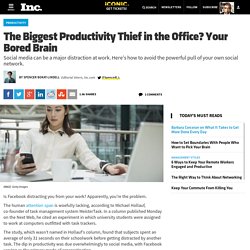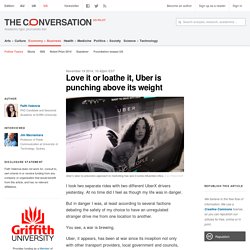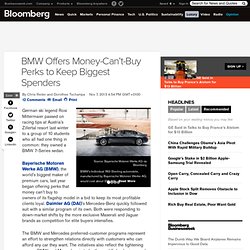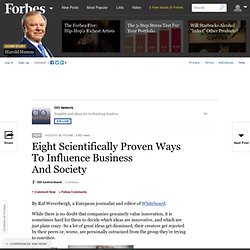

The Biggest Productivity Thief in the Office? Your Bored Brain. Is Facebook distracting you from your work?

Apparently, you're the problem. The human attention span is woefully lacking, according to Michael Hollauf, co-founder of task management system MeisterTask. In a column published Monday on the Next Web, he cited an experiment in which university students were assigned to work at computers outfitted with task trackers. The study, which wasn't named in Hollauf's column, found that subjects spent an average of only 31 seconds on their schoolwork before getting distracted by another task.
The dip in productivity was due overwhelmingly to social media, with Facebook serving as the primary mode of procrastination. Likewise, Mark Zuckerberg confirmed last year that Americans spend an average of 40 minutes a day on Facebook. 1. While social media tends to be more interesting than datasets, sometimes your brain simply craves variety. 2. Time-wasting websites are tempting enough without a constant reminder to check them. 3. Love it or loathe it, Uber is punching above its weight. I took two separate rides with two different UberX drivers yesterday.

At no time did I feel as though my life was in danger. But in danger I was, at least according to several factions debating the safety of my choice to have an unregulated stranger drive me from one location to another. You see, a war is brewing. Uber, it appears, has been at war since its inception not only with other transport providers, local government and councils, but an increasing group of journalists. This war seems to have reached a boiling point over the past few days. Much has been made of the comments from Uber’s senior vice president of business, Emil Michael, at a dinner attended by an upmarket crowd in Manhattan. He claims these comments were made off-the-record in response to an article written by PandoDaily editor Sarah Lacy, claiming she was deleting her Uber app on her phone because she felt unsafe as a woman using their services, but mostly because of their “asshole” culture.
Impact on the business. BMW Offers Money-Can’t-Buy Perks to Keep Biggest Spenders. German ski legend Rosi Mittermaier passed on racing tips at Austria’s Zillertal resort last winter to a group of 10 students who all had one thing in common: they owned a BMW 7-Series sedan.

Bayerische Motoren Werke AG (BMW), the world’s biggest maker of premium cars, last year began offering perks that money can’t buy to owners of its flagship model in a bid to keep its most profitable clients loyal. Daimler AG (DAI)’s Mercedes-Benz quickly followed suit with a similar program of its own. Both were responding to down-market shifts by the more exclusive Maserati and Jaguar brands as competition for elite buyers intensifies.
The BMW and Mercedes preferred-customer programs represent an effort to strengthen relations directly with customers who can afford any car they want. The initiatives also reflect the tightening race as BMW and Mercedes vie to be the world’s leader in upscale cars. ‘Attractive Package’ There’s a lot at stake. Maserati Ghibli Chalet Lunch Booked Capacity Hammered Silver. If Justin Bieber Is a "Lead Investor" Then Tech Titles Have No Meaning. Eight Scientifically Proven Ways To Influence Business And Society. By Raf Weverbergh, a European journalist and editor of Whiteboard.

While there is no doubt that companies genuinely value innovation, it is sometimes hard for them to decide which ideas are innovative, and which are just plain crazy. So a lot of great ideas get dismissed, their creators get rejected by their peers or, worse, are personally ostracized from the group they’re trying to convince. Say you have an idea for a Hyperloop that connects Los Angeles and San Francisco, and you want to convince the world that it should invest in it.
How do you go about that? In his classic book ‘Social Influence’, psychologist John C. A minority can make people doubt the status quo Let’s start with the good news: small groups with new ideas can radically change large organizations. But when people see someone openly disagreeing with the accepted groupthink, we try to understand why that person chooses to be a “problem.” This is also why dissenting opinions are good for organizations. Show consistency. Backlink to "Stop saying you're the Airbnb of X (The Next Web, Robin Wauters)